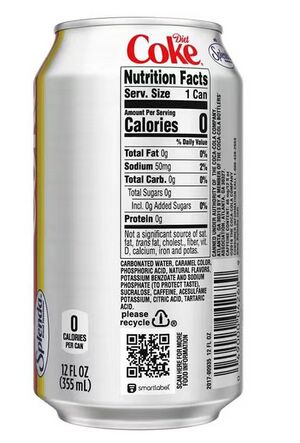Diet Coke, a classic in the realm of sugar-free beverages, has won the hearts of consumers seeking a lighter alternative to traditional sodas. Behind its effervescence and familiar taste lies a carefully crafted blend of ingredients that create a satisfying soda experience without the caloric load. In this detailed exploration, we will delve into the world of Diet Coke ingredients, unraveling the science behind this iconic zero-calorie beverage. Let’s know about all the Diet Coke ingredients and the roles they play.
Also Read: Diet Coke Nutrition Facts: A Comprehensive Overview

Carbonated Water: The Sparkling Foundation
At the heart of any carbonated beverage is carbonated water, and Diet Coke is no exception. This clear and bubbly liquid undergoes a process where carbon dioxide is dissolved under pressure, creating the characteristic fizziness associated with sodas. Upon opening the can, the release of pressure allows the dissolved gas to form bubbles, providing the refreshing mouthfeel and effervescence that define the soda experience. Carbonated water serves as the canvas upon which other Diet Coke ingredients impart their flavors, setting the stage for the symphony of tastes in Diet Coke.
Caramel Color: Aesthetics in a Sip
Caramel color is a staple in colas and plays a significant role in Diet Coke’s visual appeal. While it doesn’t contribute significantly to the flavor profile, its addition imparts the rich, dark brown color that aligns Diet Coke with the classic appearance of traditional sodas. Beyond aesthetics, caramel color enhances the overall experience, making Diet Coke visually indistinguishable from its sugary counterparts.
Aspartame: The Calorie-Free Sweetener
One of the key players in the Diet Coke ingredients is aspartame. Composed of aspartic acid and phenylalanine, aspartame is an artificial sweetener that provides sweetness without adding calories. It is several hundred times sweeter than sucrose (table sugar), allowing for the intense sweetness associated with Diet Coke without the caloric content.
Despite its widespread use, aspartame has faced controversy and claims regarding its safety. Regulatory agencies such as the U.S. Food and Drug Administration (FDA) and the European Food Safety Authority (EFSA) have extensively reviewed scientific evidence and consistently deemed aspartame safe for consumption within established limits. However, individuals with phenylketonuria (PKU), a rare genetic disorder, should avoid aspartame, as they lack the enzyme necessary to metabolize phenylalanine, a component of aspartame.
Phosphoric Acid: Adding a Tangy Twist
A common ingredient in colas, phosphoric acid contributes to the tangy flavor profile of Diet Coke. Beyond flavor enhancement, phosphoric acid serves as a preservative, extending the shelf life of the beverage by inhibiting the growth of molds and bacteria. Its presence is integral to achieving the well-balanced taste that cola enthusiasts expect, with just the right hint of acidity to complement the sweetness of the artificial sweeteners.
Potassium Benzoate: Preserving Freshness Over Time
To ensure Diet Coke maintains its freshness and quality over time, potassium benzoate is included as a preservative. This compound prevents the growth of microorganisms, acting as an antimicrobial agent that inhibits spoilage and maintains the beverage’s flavor integrity. By extending the shelf life, potassium benzoate contributes to the longevity of Diet Coke, ensuring consumers enjoy a consistently satisfying experience.
Natural Flavors: The Art and Mystery of Taste Replication
The term “natural flavors” is a mysterious phrase that shrouds the exact components in secrecy. In the context of Diet Coke, natural flavors play a crucial role in replicating the complex taste profile of traditional colas. This proprietary blend of extracts, essential oils, or compounds derived from natural sources contributes to the rich and intricate flavor that sets Diet Coke apart.
From the subtle notes of cinnamon and nutmeg to the citrus undertones, the artistry of the natural flavors in Diet Coke is central to recreating the authentic cola experience. While the specifics remain guarded, the outcome is a testament to the meticulous craftsmanship employed by The Coca-Cola Company to ensure Diet Coke remains a distinguished choice in the realm of zero-calorie sodas. Thus, it’s one of the key Diet Coke ingredients that plays a very significant role.
Citric Acid: Enhancing Acidity and Flavor Balance
Another acidulant in the Diet Coke arsenal is citric acid, contributing to the overall acidity of the beverage. Beyond adding tartness, citric acid plays a crucial role in balancing the sweetness of the artificial sweeteners. This delicate interplay of flavors creates a well-rounded taste that satisfies the palate without the need for added sugars.
Sodium Citrate: A Flavor and Preservation Ally
Sodium citrate, derived from citric acid, serves a dual purpose in Diet Coke. First, it contributes to the overall flavor profile by adding a subtle salty note that complements the sweetness. Second, it functions as a buffering agent, helping to regulate the beverage’s acidity. This multifaceted ingredient plays a behind-the-scenes role in maintaining the desired taste and quality of Diet Coke.
Understanding the Synergy: A Harmonious Blend
Each ingredient in Diet Coke contributes to a carefully orchestrated symphony of flavors, creating a product that stands as a testament to the evolution of sugar-free beverages. The selection and combination of these Diet Coke ingredients reflect not only the quest for a satisfying taste but also the response to changing consumer preferences and health-conscious choices.
Also Read: Coke Zero Vs Diet Coke: Know The Real Differences!

Conclusion: The Science and Artistry of Diet Coke
In the complex world of Diet Coke ingredients, the fusion of science and artistry results in a zero-calorie beverage that captures the essence of classic cola. From the sparkle of carbonated water to the sweet dance of aspartame and acesulfame potassium, every component plays a crucial role in crafting a guilt-free soda experience. As consumers continue to prioritize health-conscious choices, Diet Coke remains a flagship product that has navigated the changing landscape of dietary preferences.
By understanding the ingredients within the iconic silver can, consumers can make informed choices that align with their taste preferences and wellness goals. Diet Coke, with its carefully balanced formulation, invites enthusiasts to savor the effervescence, flavor, and satisfaction of cola without the caloric compromise. Hopefully, you found this article about Diet Coke ingredients helpful enough. If you really did then let us know your valuable thoughts in the comment section down below. Thanks for visiting and appreciating our work.
